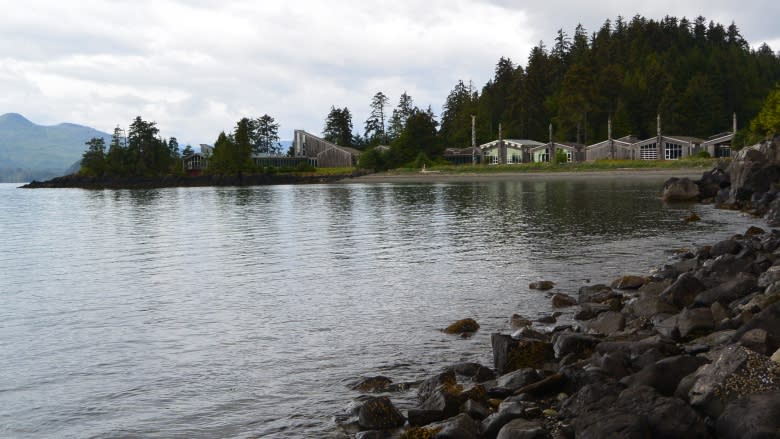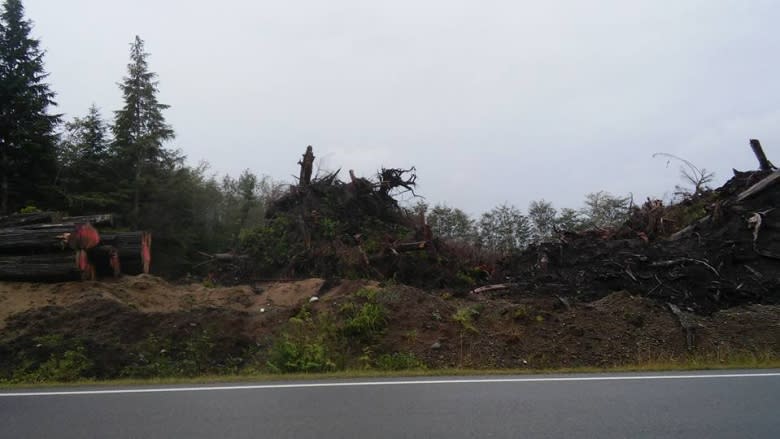On Haida Gwaii, logging plans expose rift in reconciliation
The B.C. government is "pursuing profit over culture and community" by selling logging rights on Haida Gwaii without permission, the president of the Council of the Haida Nation says.
Kil tlaats 'gaa, whose English name is Peter Lantin, compared the current mood among Haida people to 1985, when members of the Haida nation erected blockades to prevent the harvest of old-growth forests on Lyell Island.
"The pent-up frustration on Haida Gwaii has built up to the place where it's going to blow out," he said.
Kil tlaats 'gaa said the province's actions underscore deeper divisions over the future of Haida Gwaii, an archipelago off B.C.'s west coast whose physical beauty draws tourists from around the globe but whose economy is also heavily reliant on a decreasing number of forestry jobs.
The current problems stem from the province's decision to sell logging rights on two blocks of land known as Nadu River and Lawn Hill.
Under a 2009 protocol reached between the province and the Haida, resource decisions on Haida Gwaii are to be reached through consensus with representatives from both the government and Haida Nation.
View maps of the Nadu River and Lawn Hill cut blocks
On Nadu River and Lawn Hill, though, consensus was not reached. The Haida opposed the sale. The province favoured it. And B.C. Timber Sales (BCTS) put the rights to the combined 127 hectares of land up for auction.
"We're finding that there are problems with the relationship that are coming to light," kil tlaats 'gaa said.
"We've been hearing many, many forestry concerns piling up over the last few years, and what we feel is this built-up frustration."
Clear-cuts and sacred cedar
Kil tlaats 'gaa said the Haida oppose the sale for many reasons. For one, roughly 50 per cent of the stands in question are cedar, a tree central to Haida culture.
"That basically defines who we are," he said. "In every aspect of how we treat our lives, cedar is at the heart of it."
Another issue is the unfulfilled promise of a community forest on the island, to be jointly managed by the Haida and the Misty Isles Economic Development Society (MIEDS) representing Indigenous and non-Indigenous communities of Haida Gwaii.
Under the community forest model, logging practices are controlled by local governments in effort to derive more economic benefits from the harvest.
The Haida and MIEDS members say the Nadu River and Lawn Hill forests fall within the boundaries of the community forest promised to them by the previous B.C. Liberal government. They worry the province is selling future profits.
"We want the local benefits," kil tlaats 'gaa said.
"The future for the island is local control, local opportunity, local benefit, local decision-making."
The total stumpage value of the two sites is roughly $1.7 million.
Jobs needed
Meanwhile, the need for jobs on Haida Gwaii is increasingly urgent, according to Port Clements Village Councillor Brigid Cumming.
"Over the last ten years we've lost a third of our population," she said.
Cumming said she feels her community is "stuck in the middle" of the dispute between the province and the Haida.
"Certainly we need the wood but, in my opinion, BCTS would have been better advised to find consensus," she said.
Cumming also wondered why the government would go against Haida wishes in light of recent court cases, such as the 2014 Tsilhqot'in decision, which is widely believed to set the stage for more successful land claims from Indigenous communities across Canada.
"Especially in light of the court decisions that have been coming down, why the government seems determined to pick fights with the Haida is beyond me."
'Where can I see the trees?'
Cumming said another factor is the increased visibility of logging on Haida Gwaii, an area of great natural beauty.
"Tourists come in and they're like, 'where can I see the trees?" she said. "People don't like to come to the island and see stumps."
B.C. NDP Forests Minister Doug Donaldson said he's aware of the issues, but argued many of the problems, including the unfulfilled promise of a community forest, stem back to the previous Liberal government.
"I've been on the job four months," Donaldson said. "I'm not happy with how long this has taken [and] I'm very hopeful we'll be working... to resolve this issue soon."
With files from George Baker
Correction : The article originally stated the total stumpage value of the two sites is roughly $1.7 billion. It is roughly $1.7 million. (Dec 09, 2017 11:39 AM)



